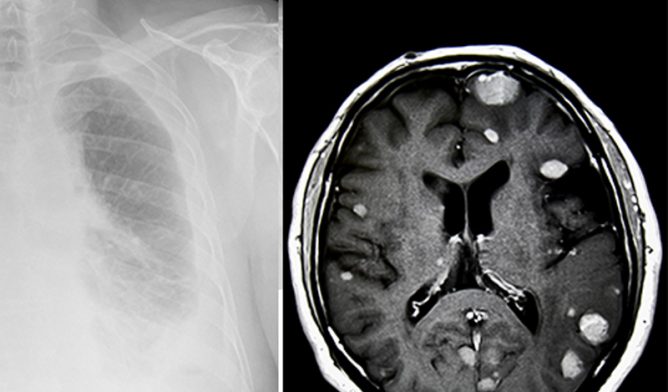Can Mesothelioma Spread to the Brain?
Cancer & CaregivingWritten by Karen Selby, RN | Edited By Walter Pacheco

Brain metastasis is rare, even for pleural mesothelioma’s final stages, but it does occur. A 2017 study published in the Journal of Clinical Oncology shows that only 3% of mesothelioma cases spread to the brain.
Mesothelioma tends to spread locally before spreading to a distant part of the body such as the brain. The cancer forms in the pleural lining of one lung and spreads into nearby lung tissue, lymph nodes and the chest wall.
Tumors may cover most of the tissue in the chest cavity before spreading to distant parts of the body.
How Does Mesothelioma Spread to the Brain?
Mesothelioma cells reach the brain through the circulatory system, also known as the vascular system. The circulatory system connects to every organ and part of the body.
It is made up of vessels that carry lymphatic fluid and blood. These parts of the system are called the lymphatic system and bloodstream, respectively.
The process begins when cancer cells directly invade nearby lymph nodes and blood vessels. Once inside, cancer cells can travel throughout the lymphatic system and bloodstream.
Mesothelioma cells can reach distant parts of the body by travelling through this interconnected system.
Often, spreading cancer cells die naturally at some point in the metastatic process. Some cells survive and move into tissue at a distant location, where they may form a new tumor or lay dormant for years before they begin to grow again, if they grow at all.
While cancer cells may reach the brain region through the lymphatic system, they can only cross the blood-brain barrier through the bloodstream.
Once cancer cells break through the blood-brain barrier, they tend to form tumors along small blood vessels rather than brain tissue.
Treating Brain Tumors in Mesothelioma Patients
There are only a few documented cases of mesothelioma patients receiving treatment for brain metastases.
In a 2017 case report published in the Journal of Neurology, Neurological Science and Disorders, a 66-year-old man developed slurred speech and drooping on the right side of his face 1 1/2 years after undergoing surgery and chemotherapy for pleural mesothelioma. An MRI revealed two masses on the left side of his brain.
He underwent a successful surgery to remove the tumors. In addition, he received post-surgical fractionated gamma knife radiosurgery, which is a type of radiation therapy delivered after the patient has recovered from surgery to kill any remaining cancer cells. The patient was doing well three months later with no recurrence.
In a 2013 study published in the Journal of Surgical Case Reports, a 62-year-old man with pleural mesothelioma was treated for a brain metastasis with surgery. His history of asbestos exposure involved working for 20 years in aluminum and margarine factories.
He was initially treated with surgery and refused chemotherapy and radiation therapy. Eighteen months later, he developed weakness on the left side of his body and left-sided homonymous hemianopia, which is a brain condition that results in vision loss. An MRI scan revealed a brain tumor.
Surgical removal of the tumor was successful, and the patient had a good recovery. A biopsy test of the brain tumor confirmed it was metastatic mesothelioma.
At a six-week follow-up appointment, the patient was continuing to improve.
See Your Doctor If You Develop Certain Symptoms
Case reports of mesothelioma patients who developed brain tumors reveal that each patient developed certain symptoms, including:
- Muscle weakness
- Muscle spasm
- Facial drooping
- Vision loss
- Slurred speech
Mesothelioma patients don’t need to request a scan of their brain to make sure the cancer hasn’t spread there. They also shouldn’t unnecessarily worry about the risk of developing a brain metastasis because it is so rare.
Just watch out for the above symptoms and make an appointment with your oncologist if you develop any.






